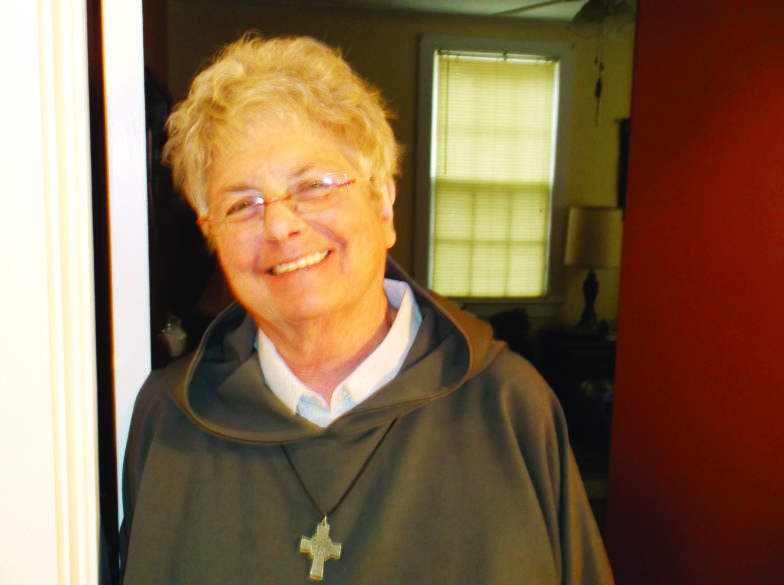
FROM THE HERMITAGE
By Sister therese alies
“I had no plan, I just met people and people with disabilities awoke my heart.” So spoke Jean Vanier one day when being asked how L’Arche communities began and how they had grown.
Sometimes our lives are blessed with meeting or being near special persons. One of the things that makes someone special is that they reveal to us something of the truth about ourselves, maybe our inner beauty, some gift or even our struggles to live an authentic life. I was blesed to have had this experience. Sometimes even fleeting moments or short-extended stays, or a retreat venue is just enough to turn one’s life ever more deeply into a more loving discipleship.
On Wednesday, May 7, Jean Vanier, died. He was 90 years old and for the last 50 or so years devoted himself to the handicapped, disabled and those with intellectual disabilities all around the world. Often people with various handicaps are not welcome in their own homes, the parents feeling it is their fault or not having the proper support to raise a special needs child.
Jean was a young naval officer who left the Canadian navy to ‘follow Jesus.’ He did academic work and was a college professor. One summer he went to a small village in France and studied with a Dominican priest and a few other fellows like himself. They spent the summer visiting the local ‘asylums’ and God spoke deeply to his heart. He went out and bought a small cottage and invited the first two men into his home. Neither could speak and both had severe disabilities. Jean had never been trained how to help the handicapped. He just felt called to live with them. This was the founding of L’Arche Communities in 1964.
Now there are more than 154 communities in 39 countries where folks with a variety of disabilities are welcomed for life, living with those whose handicaps (don’t we all have them?) are less visible or debilitating. Some assistants who come as sort of ‘midwives’ to help others grow to maturity will live with core members for a year or two. Some much longer. Folks living in L’Arche communities are welcomed into a rich life of relationships, the very thing Jean writes, in his more than 30 books, are at the heart of our deepest need. This includes a deep faith life for those who wish. Though Catholic, communities are made up of folks from every culture and religion. Closest to us in the South are the communities in Atlanta, Jacksonville, Mobile and St. Louis.
Jean made sure to quote Dorothy Day when told he was a ‘living saint.’ She quipped near the end of her life “Don’t call me a saint. I don’t want to be dismissed that easily!” Of course, she is indeed now a Servant of God. I suspect he will be too.
Jean and Dorothy were both people of the Way – those who took seriously the many messages of Jesus, especially those calling us to service of the most vulnerable. Pope Francis has reminded us of the ‘peripheries’ more than once. Perhaps as the Canadian writer and former L’Arche member Carolyn Whitney-Brown reminds us ”he is an icon, not an idol.”
Some 40 years ago I was pleased to be a small part of the Tahoma Hope L’Arche community in Tacoma, Washington. David Rothrock, one of the founders, reminds us, “There are not many people who become internationally acclaimed because they treasure weakness and vulnerability”
Probably Jean’s best international bestseller is Becoming Human. The book is actually five talks he gave for the Massey Lectures commissioned by Massey College of the University of Toronto and broadcast on the Canadian Broadcast show, Ideas.
The first of Jean’s seven aspects of love is reveal. “To reveal someone’s beauty is to reveal their value by giving them time, attention, and tenderness. To love is not just to do something for them but to reveal to them their own uniqueness, to tell them that they are special and worthy of attention … this revelation heals … the belief in the inner beauty of each and every human being is at the heart of L’Arche … as so as we start selecting and judging people instead of welcoming them as they are — with their sometimes hidden beauty, as well as their more frequently visible weaknesses — we are reducing life, not fostering it. When we reveal to people our belief in them, their hidden beauty rises to the surface where it may be more clearly seen by all.” Thank you, Jean, for sharing the gift God entrusted to you for the good of us all. Rest in peace.
BLESSINGS.
(Sister alies therese is a vowed Catholic solitary who lives an eremitical life. Her days are formed around prayer, art and writing. She lives and writes in Mississippi.)
